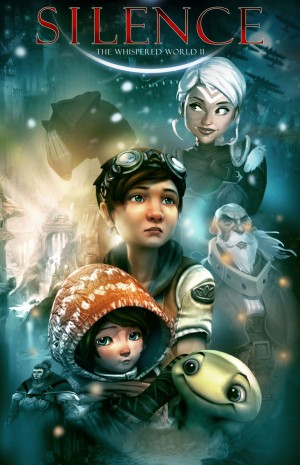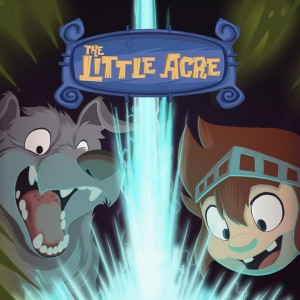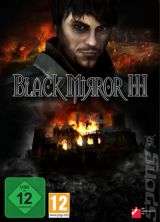Review for Tales
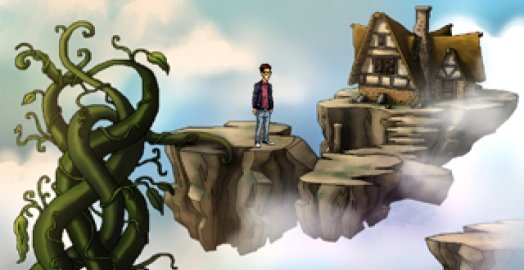
Stop me if you've heard this one before: there are these magical books describing worlds that are not merely imaginary but real places you can visit just by reading them. The premise may sound familiar, but rather than another Myst game, here it’s from Tales, by Italian indie developer Ape Marina. As the title suggests, the stories here are a little closer to home: myths, legends and literary classics, some famous and others more obscure. In this traditional point-and-click adventure, the fate of storytelling itself is at stake. That sounds ominous, but in fact Tales treats its subjects with a light touch, educating and entertaining in equal parts. It may be a little ponderous in places, but the puzzles are satisfying and (if you're anything like me) you'll come away with the sudden urge to read a good book.
Alfred Walsh knows a cushy job when he sees one. So when he's invited to be the "guardian" of a strange library, he jumps at the chance. Getting paid to look after some old books, maybe dust them once in a while? Yes, please! Except there's this old chest in the corner of the room, and Alfred is curious… how was he to know it contained the eldritch horror, Oblivion? Someone should really have warned him there was a story-devouring monster in there.
For this is a very special library, the tales told in its books not mere words on a page but living worlds, as real to their inhabitants as ours is to us. Just reading one of the volumes is enough to suck you in, body and soul. Of course, not all stories are good, not all characters benevolent. Oblivion is the worst of them all, which is why he and his black book were locked away in a trunk that was never to be opened. All this the previous librarian explained in a note to his successor, a note that Oblivion was able to blow out of the window at just the wrong moment. Fortunately, the forces of fate are able to guide it back in again, but too late to prevent catastrophe.
Oblivion, you see, is the devourer of tales. Unless he's stopped, all of mankind's stories will be eaten away, and with them the touchstones our culture is built upon. All is not lost, though: Oblivion has been defeated once before, by the demigod Gilgamesh. (There's a reason the tale of Gilgamesh is the oldest one we still know.) All Alfred has to do is find the right book, seek out Gilgamesh and beg for his help before Oblivion's disease spreads throughout the library, wiping out the books within. Should be easy, right? Naturally, this seemingly simple errand quickly spirals out of control, leading the plucky librarian on an epic journey across literary works, meeting such figures as the wizard Merlin, the Greek hero Bellerophon, the giant Pantagruel and adventurer Phileas Fogg along the way. He'll be sacrificed to the Mayan gods, cook for a queen and trick an ice giant, all in the name of saving their stories.
Perhaps appropriately for a game obsessed with the classics, the graphics are unapologetically retro-styled. Every pixel has been crafted with care, making for lush, detailed backgrounds and nicely animated characters. It's a cartoonish look, but a very classy one, in the vein of the original Broken Sword or Wadjet Eye's output. You visit a nice variety of environments in your travels too, from a quaint half-timbered inn amid verdant English countryside to an arid Greek mountaintop and a giant's house in the sky. Each area may be small, accounting for a handful of screens at most, but they're all distinctive and full of character.
This is backed up by a soundtrack that's similarly atmospheric and varied. Each story gets its own feel, from Merlin's jolly medieval minstrels to Gilgamesh's spritely Arabic dances and Pantagruel's stately Renaissance fare. Admittedly, most stories only feature a couple of distinct tunes, but you rarely stay in one place long enough for this to get old. Instead, as you jump from book to book, the music instantly envelops you in your new surroundings.
The voice work is decent on the whole, but not up to the same standard. Alfred, for example, is amiable but a bit deadpan, taking in all the mythical locations with barely a raised eyebrow. Granted, having him constantly gushing with excitement or shrieking in fear would have been annoying, but I could have done with a bit more engagement. The supporting cast, meanwhile, vary from good to slightly flat in their deliveries, and there are some minor issues with volume levels. The Queen of Uruk, in particular, was hard to hear over the background music. This is a small point, but it would also have been good if the cast had at least agreed on how to pronounce the many unusual names and places that crop up: I heard "Pantagruel" at least three different ways, and I'm pretty sure the proud and ancient city of Quiché isn't also the inspiration for the filled pastry dish.
The interface is mostly standard, with left-click to interact, right-click to examine, and an inventory that drops down when you mouse up to the top of the screen. One quirk, though, is that sometimes interacting with an object brings up a close-up view of it in a smallish window. While this maintains context (as you can still see the rest of the room), moving the mouse out of the window dismisses it instantly. They are used either to show you important information or give you a puzzle to solve, and it's all too easy to move the pointer just a little too far and have to click on the object again to get the window back. I'd definitely have preferred it to stay in place until you clicked elsewhere.
The inventory deserves some more explanation. When you travel into a new story, you leave behind everything you had in the library and build a new inventory unique to that tale. Merlin, who acts as your guide to the literary worlds, provides the only two exceptions to this, giving you a magic bell and bag early on. These magical objects are available in all stories, and have special properties. Ringing the bell pulls you out of the book you're in and returns you to the library, while the bag allows you to transport an object across stories. Put an object in there in one story and it'll still be there when you arrive in another. Be careful what you pick, though, as it can only hold one object at a time.
These are simultaneously neat ideas and occasionally frustrating. The bell, for example, can be taken from you, temporarily stranding you in the current tale. The bag, meanwhile, opens up a whole world of anachronistic options for solving your present predicament: if there's nothing to help you here, try somewhere else. Need to mollify someone by cooking a fabulous dinner? Maybe a famous glutton from another era can help. The ingredients don't grow around here? I bet a merchant in another story will have some in stock. Most of the puzzles, in fact, revolve around acquiring objects in one place that you can use in another, bouncing you around the stories as you put them to unexpected uses. The web of connections you have to make is intricate and satisfying, but it's also made needlessly awkward by the bag's small size. I was forever going back and forth to retrieve things, only to leave them behind in the wrong story. By the end, I was running around just trying to remember where I'd put something or other. Fortunately, you can't take anything that has no use anywhere else, which at least cuts down on the possibilities.
There's a nice mix of inventory and dialogue puzzles, with some minigames and riddles thrown in. The old-school sensibility is in full force here too, so be prepared to keep a pencil and paper handy to write down clues and figure out secret codes. You'll find yourself decoding ancient Greek, playing Mayan tic-tac-toe, repairing a water mill and convincing Dante to be your guide to the underworld. These can be challenging at times, and require a certain amount of guesswork and trying out possibilities, but they're not unfair. The one time I felt hard done by was near the end, where the magic bag can suddenly be put to a new use that hadn't been possible before; some hints there would have gone a long way.
Speaking of hints, they're provided here by everyone's favourite wizard, Merlin. He's pretty good at giving you gentle tips, but less willing to come right out and tell you the solution if you're really stuck. You'll also be directed his way when you get to a point where you can't continue without exploring a new story: he's the only one who can tell you where to go next. As such, if you want to complete the game on your own, be careful how you talk to him so you only get the information you need and don't accidentally pick up some extra hints as well. Since he's your guide and mentor throughout, all this fits neatly into the story, but it can also get frustrating during the sequences where you're separated from your bell. Because you can't get out of the current story, you can't go to see Merlin and you're really on your own for a bit. That said, this doesn't happen often and the fact that you can't go anywhere means there aren't that many options to explore and it's difficult to get too stuck.
The tales in Tales are a nicely mixed bag, from “Jack and the Beanstalk” to Greek and Norse mythology. They're mostly legends and fairy tales, though, with only the odd foray into literature, and old literature at that. With the exception of a cameo from Around the World in Eighty Days, the most recent title in the roster is the 16th-century Gargantua and Pantagruel. On the one hand, that means they'll be new and interesting to most players, but on the other it would have been welcome to see some more well-known literary figures. I'd have loved to pick Sherlock Holmes' brain, for example, or go visit Scrooge on Christmas night. The obscurity of the stories also means that someone needs to regale you with a synopsis of each for context, which again is a mixed blessing. I learnt a lot, but it also bogged down the early stages of each yarn a bit.
In the same way that many of the tales are lesser-known, your role is often incidental to them: you're always well aware that you're a guest in someone else's narrative, not the hero. As always, you help out a bit, but there's a reason Alfred Walsh's name isn't writ large in the sagas of old. To me, though, it was refreshing not to be thrust into the leading role all the time, and it meant that the stories served as adventure tapas, many snack-sized pieces rather than one or two meaty fables. It was good, too, to see the dialogue treated with a spritely touch. The characters you meet aren't burdened by olde worlde speech and the knowledge that the weight of the world is on their shoulders, instead being more likely to greet you with a cheery, "Hey, dude!" They'll also occasionally give you acerbic commentary on everything from Uruk's bureaucracy to Bellerophon's angst at being mistaken for Hercules. They seem human, with ordinary human troubles and humour, and do a good job of making their lives and worlds feel real.
Tales is an adventure in the classic mould, from the lovely but retro graphics to the charmingly varied music and tricky puzzles. That means a challenging and varied 8-10 hours of gameplay, but also some finicky moments and a little mechanical awkwardness. Look past the occasional clumsiness, though, and you'll find a lot of heart, unusual stories and believable characters. If you like myths and literature, meaty puzzles, or even just playing with Thor's hammer and Jack's beanstalk, this game comes heartily recommended.


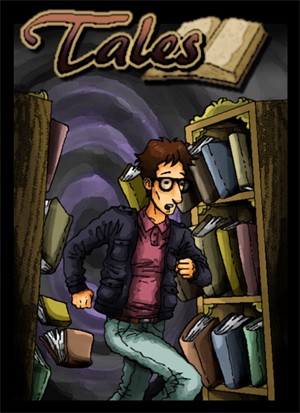
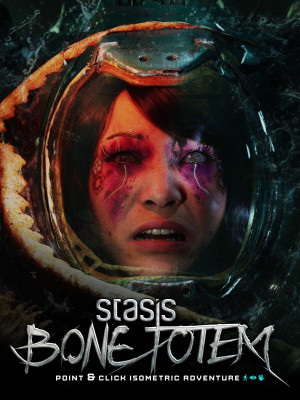






![Event[0] - Game Review](https://cdn.nivoli.com/adventuregamers/images/screenshots/31241/image001__medium.jpg)


